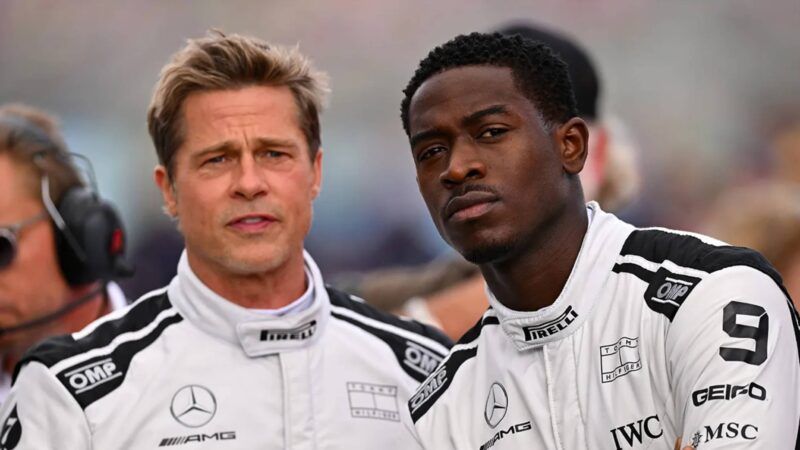F1 Is a Perfect Summer Movie
A roaring, swaggering, immensely entertaining throwback to the Jerry Bruckheimer Dad Action Movies of yore.

F1 is not the best movie I have seen this year. It is formulaic, predictable, frequently absurd, and more than a little bit shameless. But while it is not the best, it is the most roaringly entertaining, a nearly perfect summer movie fueled by real movie star charisma, heart-stopping racing footage, and more than a little bit of old Hollywood magic.
The movie stars Brad Pitt as an aging, jack-of-all-trades race driver pulled onto a failing Formula 1 as a last-ditch effort. He matched with scruffy Javier Bardem as the team owner, and tough-minded Kerry Condon as the car engineer and love interest. It's directed by Joseph Kosinski, who put Tom Cruise in a fighter jet for Top Gun: Maverick, and it similarly features can-you-believe-it footage taken with real actors driving at high speed in actual Formula 1 cars. It's written by Ehren Krueger, an old Hollywood hand who has scripted Transformers sequels, big-budget Disney remakes, original thrillers, and a Scream movie. The pulsing, pummeling score comes from Hans Zimmer, the man who gave us so many summer movie BWAAAHMs.
These are all Tinseltown pros, and they all add something important to the movie.
But the credit that might matter most is the one that appears before the movie even begins. This is a Jerry Bruckheimer production. Bruckheimer is more than a professional. He's a legend.
If you are a fan of high-concept, high-style, high-attitude action movies from the 1980s and 1990s, you are probably a fan of Jerry Bruckheimer, whether you know it or not. Bruckheimer, often with partner Don Simpson, produced a legendary run of what we might now call Dad Action Movies starting in the mid-1980s, with Top Gun, Crimson Tide, Bad Boys, The Rock, Con Air, Enemy of the State, and Armageddon all on his resume. When Bruckheimer's lightning logo flashed across the screen before the opening credits, it was a sign that you were going to see a movie that tried really, really hard to be awesome.
Bruckheimer's filmography blended masculine movie star charisma with directorial swagger and style, a bro-y intensity with a deft populist touch and a sort of manic determination to overdeliver for audiences. His stories tended to center on aggressive men who took matters into their own hands, often when the prevailing authorities proved clueless. There was, occasionally, an anti-government, pro-private sector sensibility to his films—in the winking government skepticism of The Rock and Con Air, and perhaps most famously in Armageddon when the asteroid-destroying oilmen heroes ask to be rewarded by never having to pay taxes again.
But Bruckheimer wasn't in any deep sense a maker of political films. He was a mass market entertainer whose films tapped a blue-collar populist streak. He took his responsibilities incredibly seriously, and the results were some of the most ridiculous—and ridiculously enjoyable—summer confections ever.
F1 isn't a nostalgia play. But it plays like a modern update on the old Bruckheimer formula, with his specific sensibility embedded in every frame.
There's an aging, charismatic star teamed with a hotshot director, and an appealing silly premise: an F1 team loses its top driver and hires an old has-been (Pitt) who has bummed around the racing world but hasn't driven Formula 1 in 30 years. His presence sparks a rivalry with the team's number two driver, a hotshot rookie (played by Damson Idris) who longs for the spotlight. The two have to learn to work together while racing fast cars and generally looking and being awesome.
You can guess most of the story beats before they happen. But the thing is—F1 really is awesome.
Kosinski's do-it-for-real approach to shooting the race sequences, with souped-up race cars zooming along actual race tracks at 200 miles an hour, once again makes the case for analog action. Unlike so many of the soft, weightless, pixelated, CGI junk that fills screens today, F1's race sequences look impressively physical and dangerously real, with screeching tires and sparking engines and real human bodies gripped and girded by the forces of gravity. The maximalist audio—see this in the loudest theater you can find—adds further oomph and intensity. This isn't a movie designed to make you think, "Ah yes…cinema." It's a movie designed to turn your brain into jelly as you silently mouth "holy shit" and "hell yeah" over and over again. It's genuinely thrilling stuff that you've never seen before.
Which, for a reported $300 million, it should be. But that's no longer something that can be assumed of today's ho-hum blockbusters, which often seem more concerned about checking off IP-expectations boxes than fulfilling their obligation to entertain. Bruckheimer had his share of clunkers over the years, and his extremely dude-centric movies may not be for everyone. But at his best, he understood that crafting no-compromises razzle-dazzle entertainment was not just a job but a sacred and solemn duty.
Every time Hollywood sells a movie ticket, it makes a promise. Unlike so many of its contemporaries, F1 actually delivers, all the way to the finish line.
